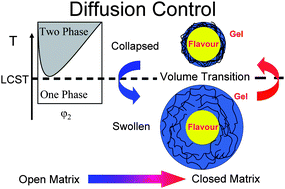Encapsulation is used to decrease the premature release of volatile flavour ingredients while offering protection against environmental damage such as oxidation, light-induced reactions, etc. Hydroxypropyl cellulose (HPC) is investigated here as a “smart,” temperature responsive membrane for flavour encapsulation and delivery. Gel films were synthesized and characterized by diffusion and small-angle neutron and X-ray scattering techniques. Increasing temperature typically increases the diffusion rate across a membrane; HPC, however, can be tailored to give substantially improved elevated temperature properties. Scattering results indicate processing conditions have a significant impact on membrane morphology (micro phase separation). Under certain synthetic conditions, micro phase separation is mitigated and the membranes show temperature-independent diffusivity between 25 °C and 60 °C.
You have access to this article
 Please wait while we load your content...
Something went wrong. Try again?
Please wait while we load your content...
Something went wrong. Try again?


 Please wait while we load your content...
Please wait while we load your content...